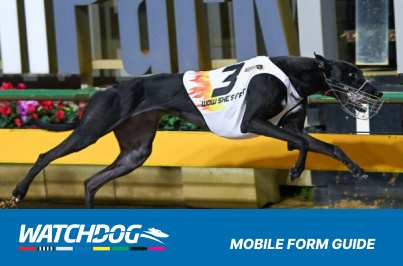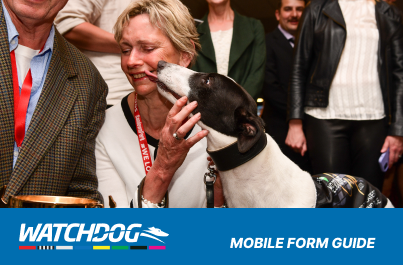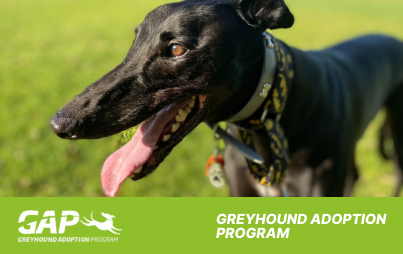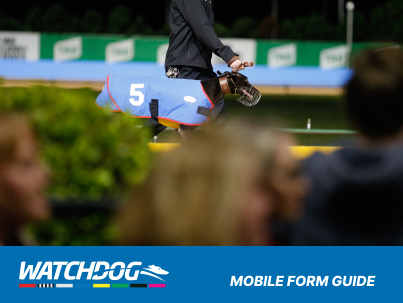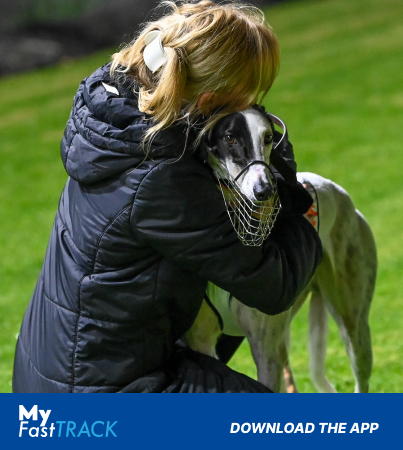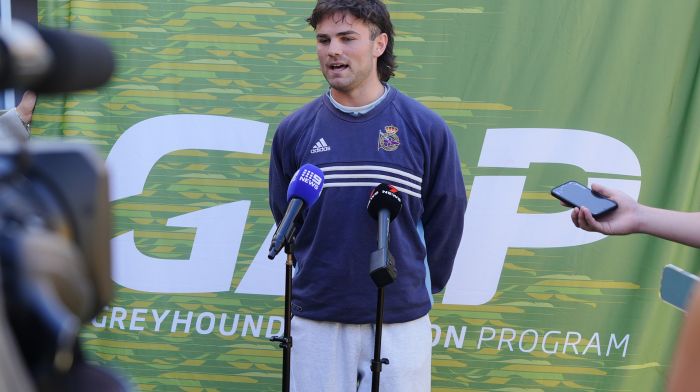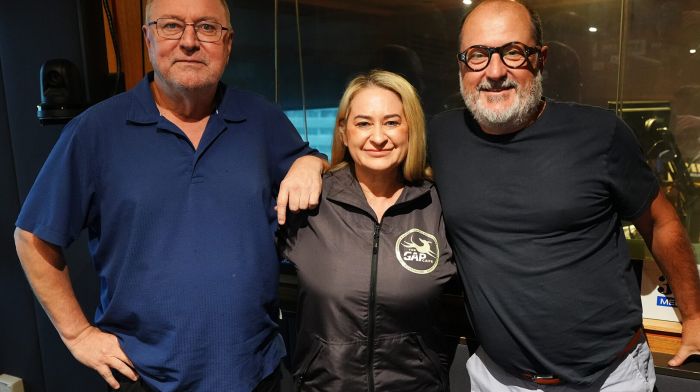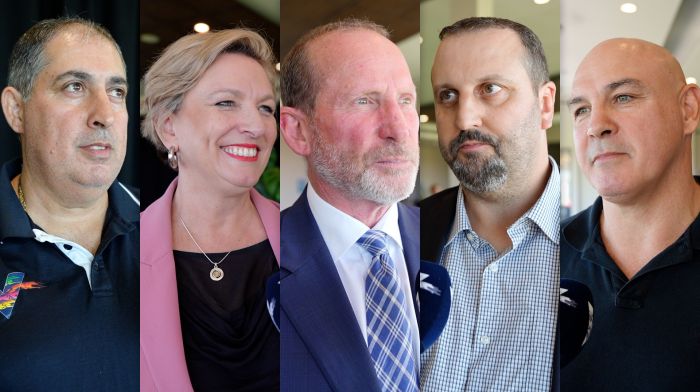Racing 101
Here’s a list of some of the common terms used within the greyhound racing vernacular.
Common Terms
A trial where the greyhound is allowed to catch and grab an artificial lure after running a nominated distance.
Generally used to describe the starting position drawn in an event.
The official random computerised drawing of the starting positions (box) of the greyhounds in a race or event. Describes the action of drawing the official starting positions of the runners in a race or event. Box Draws can be watched live via FastTrack.
Any trial track used predominantly to teach greyhounds to jump from the starting boxes and chase a lure, generally 300 to 400 metres in length, maybe straight, circle or oval in shape. The track must be registered with GRV.
A qualification that allows a person to breed greyhound dogs.
A female greyhound used for or intended to be used for breeding.
A circular steel rail inside a small circular running surface with a hand operated artificial lure, generally not exceeding a 60 metre circumference, used predominantly to teach greyhounds to jump from the starting boxes and chase an artificial lure.
A section of the racetrack capable of being enclosed to stop and catch the greyhounds at the end of a race; this generally includes a run-off chute.
Interference received by the greyhound during a race, possibly causing the greyhound to lose momentum and time (lengths) in that race.
The Steward in charge of the GRV Stewards Panel.
Generally used to describe an oval or circular Trial or Racetrack.
Clearances are for specific tracks which come as a result of previous track ban for a track.
When a greyhound penalty has been lifted it can either be lifted for all tracks (Cleared All Tracks) or lifted for all but some tracks, for example: CAT ex HOR (Cleared All Tracks Except Horsham). It is typically lifted as a result of a trial.
An organisation that manages meetings at a track.
A person employed by a Racing Club to officiate and assist the GRV Stewards during a race meeting.
A Registered Greyhound Racing Club that conducts Plumpton meetings (see Coursing Plumpton). Coursing consists of a race where two greyhounds compete on a straight track and are released from a set of slips instead of a Starting Box. Generally conducted with a Drag Lure.
The mother of a litter of registered pups. A Brood Matron that is the registered producer of a specific greyhound.
A wire mesh enclosed space generally not exceeding 50 square metres where one of more greyhounds may spend periods of time recuperating outdoors.
A person that is currently not allowed to nominate or race greyhounds due to an outstanding fine with a greyhound association. This is wider in that the effects of a Defaulter is the same as a Disqualified Person.
Disqualified under the racing rules – the person does not, during the disqualification period, have a right or benefit conferred by registration under the racing rules.
Used to describe the distance covered by runners in a race from the front of the starting box to the finish line. Generally measured 1 metre out from the rail.
A hand operated or battery operated winch used to pull a small piece of artificial material along the centre of a Slipping Track to entice a greyhound to run to the other end.
Notes made against the dog such as penalties, lifting of penalties and warnings on their dog card. No longer applicable in Victoria, but still used interstate.
A series of 2 or more long, narrow fenced enclosures used to exercise greyhounds adjacent to each other. Each yard is generally 100 to 120 metres in length and 4 metres wide.
The computer system used by GRV to administer greyhound racing in Victoria and to manage GAP.
Generally used to describe the combined runners in a race.
Generally used to describe the recent performances of a greyhound.
A publication listing the race performances of the greyhounds in a specific race (refer to The Watchdog www.thewatchdog.com.au)
A person that undertakes Foster Care of a greyhound for a short period of time. This includes housing the greyhound and looking after it.
Greyhound Adoption Program. A dog that has retired from greyhound racing and has been accepted into the GAP program. A GAP dog may be in any stage of the adoption process including having been fostered. This program is financed and administered by GRV to place retired greyhounds in private homes as pets and has found homes for over 4000 greyhounds since 1996.
Greyhound Owners Trainers Breeders Association of Victoria (GOTBA Victoria) is a not-for-profit association, which seeks to safeguard and promote the interest of its members, including owners, trainers, interested persons, attendees and breeders of greyhounds in Victoria. GOTBA Victoria promotes the welfare of all greyhounds and the education of participants in the care of greyhounds. They work for the betterment of greyhound racing, co-operating with all clubs and interested parties. We aim to encourage and foster the success of greyhound racing.
Used to describe the classification of a specific race, and/or the classification of a greyhound at a specific racetrack and distance.
GA is the constituted body representing all of the legislated State Greyhound Authorities in Australia and New Zealand.
Greyhound Racing Victoria.
Greyhound Racing Control Board. The old name for Greyhound Racing Victoria.
Investigator means a person appointed by the Board pursuant to LR 48.1.
A person qualified to judge a race and enter components of the race result.
Describes the individually enclosed space used to house a single greyhound.
May describe a group of individual kennel spaces in a single building and/or a property that has the facilities for housing (kennelling) greyhounds.
The act of registering dogs arriving at a race track, and placing them in the allocated kennels. Kennelling includes greyhound identification, undergoing an vet inspection, trainer identification, recording the greyhounds weight, and placing the greyhound into the assigned kennel for the race (or trial)
A litter of dogs born at the same time from the same sire and dame, which is registered.
The actual item that a greyhound chases and generally consists of an artificial toy.
The arm that protrudes out from the Lure Carriage to which the lure is attached.
The mechanical trolley used to carry the lure along the inside rail of a race or trial track.
The action of allowing a greyhound to chase and/or catch a lure attached to a mechanical device.
Describes a greyhound that has yet to win a race and/or to describe a specific grade of race for greyhounds yet to win a race.
The lengths between each greyhound during the race and across the finishing line (a length = 0.067s). Check national rule – .063?
The markings of a dog, such as colour, patterns, toe colours, etc., that are used to identify a dog and form part of the Dog Certificate of Registration.
National Coursing Association.
The act of nominating a greyhound for inclusion into a race or event either conducted by phone or online.
A person registered by GRV for the purpose of owning a registered greyhound eligible to be nominated for a race or event.
A person registered by GRV to train greyhounds of which he or she is the owner of part owner of.
The type of race/event where two greyhounds compete on a straight track and are released from a Slip Lead instead of a Starting Box. Generally conducted with a Drag Lure.
A trial where the time recorded by the greyhound is not on display to the general public.
A person registered by GRV to train greyhounds for a registered owner.
A trial where the time recorded by the greyhound is displayed for the general public to view.
A wire mesh enclosure where young greyhounds to the age of four months are kept. May be attached to a whelping kennel.
Trials that are conducted by a Race Club under race conditions to select greyhounds for inclusion into a specific race or event.
Used to describe the actual race/event.
A kennel where a greyhound is housed at a racetrack prior to racing.
A listing of the races/events to be conducted at a specific meeting, the names of greyhounds and trainers, the official box draw and may include the recent form of the greyhounds engaged. May also be used to list proposed races/events to be held at a specific venue at a future date.
May be used to describe a specific race venue and/or the actual running surface and area set aside for the conduct of a race or event.
A kennel where a single greyhound in race training is housed.
When a greyhound moves to the inside of the field and follows the rail during a race.
A wire mesh enclosure used to house young greyhounds, generally between the ages of four to thirteen months of age. Generally includes a building (kennel) used as sleeping quarters.
Used to describe the condition of being registered with GRV. May be applied to person or greyhound.
The act of becoming registered. May be applied to person or greyhound.
The Certificate issued by GRV that lists the registered name of the greyhound, whelping date, the names of Sire and Dam and the names or the registered owner/s.
Used to describe an individual race by an individual dog. This word is used primarily in reports describing x number of runs per year for example.
A test kit used to evaluate a sample of either blood or urine, typically for the presence of prohibited substances in a greyhound.
The removal of a dog from the race before race day allowing for a reserve to run in its stead.
See Qualifying Trial.
A large board at the greyhound track, which typically shows the places and times for dogs having just completed a race.
A male dog that is registered for being a breeding dog, either by natural means or artificial insemination or for frozen semen. A stud dog that is the registered father of a specific greyhound.
A long narrow wire mesh enclosure used to allow a greyhound free running exercise.
When a greyhound has a break from racing (e.g. illness).
A designated kennel, perhaps away from other dogs or disturbances, for greyhounds that are having a break from racing generally.
The time (seconds) in which the leading greyhound approached the designated section of the track.
An amount of time for which a greyhound cannot race. The stand-down period is typically imposed by a steward on a vet’s advice.
The boxes where the greyhounds commence the start of a race.
A person employed and empowered by the Board of GRV to conduct race meetings and enforce the Rules of Greyhound Racing in Victoria.
A long fenced off area; approximately 400 metres where greyhounds can be slipped or free galloped. Normally grass or sand surface.
A sample taken from a greyhound (generally urine, but include blood, saliva, hair, excreta or other substance) that is used to determine if prohibited substances are present in a greyhound. Samples can be taken pre-race, post-race or out-of-competition and some are frozen for up to 10 years.
A person who is registered to train, kennel, nominate and race a greyhound.
The processes involved in getting the greyhound into a condition suitable for racing. Involves diet, trialling, racing and general care of greyhounds.
Can be solo, double or in a half-field, where greyhounds go around a racing track similar to race conditions obtaining split and overall time for an indication of performance.
A registered entity with GRV, which operate smaller circular racing tracks, approximately 400 metres, normally used when breaking greyhounds in before heading to the actual racetrack.
Observations made by the track veterinarian where an injury/illness stand off period is given to a greyhound.
The date a litter of pups were born.
A specific kennel designed for the birth of a litter of pups. Would include a larger bed for mother and puppies and electricity outlets for lighting and heating.
When a greyhound moves to the outside of the field during a race.
LATEST VIDEOS


